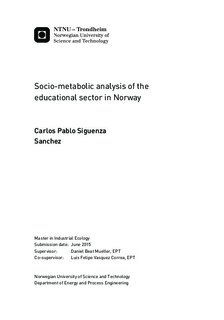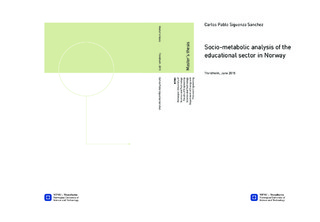| dc.contributor.advisor | Mueller, Daniel Beat | |
| dc.contributor.advisor | Vasquez Correa, Luis Felipe | |
| dc.contributor.author | Siguenza Sanchez, Carlos Pablo | |
| dc.date.accessioned | 2015-10-05T14:51:32Z | |
| dc.date.available | 2015-10-05T14:51:32Z | |
| dc.date.created | 2015-06-29 | |
| dc.date.issued | 2015 | |
| dc.identifier | ntnudaim:13832 | |
| dc.identifier.uri | http://hdl.handle.net/11250/2350158 | |
| dc.description.abstract | Currently, industrial ecology frameworks and methods are increasingly used to study the social metabolism and address environmental implications and climate change mitigation. Despite many models in these studies use the population as a driver, demographical dynamics and interactions in the social environment have not been integrated. To continue the development of this integration in Material Flow Analysis (MFA) models, we focus on the Norwegian education sector from a demographic and anthropological life cycle perspective. Using MFA methods, we designed a stock flow model of users and suppliers in the education system to identify the patterns and drivers of shape these stocks and flows, which in turn may have an effect in the magnitude of the supply of other services. The boundaries of the model include the population of Norway and its transformations when it moves from, within, and across the education system. Our results confirm that the supply of teachers by the Norwegian education system was insufficient in the year of study (2013) and we have identified and quantified patterns in the population that cause such insufficiency. Among them: retirement, deaths, and enrollment and graduation rates. | |
| dc.language | eng | |
| dc.publisher | NTNU | |
| dc.subject | Industriell Økologi, Environmental Systems Analysis | |
| dc.title | Socio-metabolic analysis of the educational sector in Norway | |
| dc.type | Master thesis | |
| dc.source.pagenumber | 113 | |

